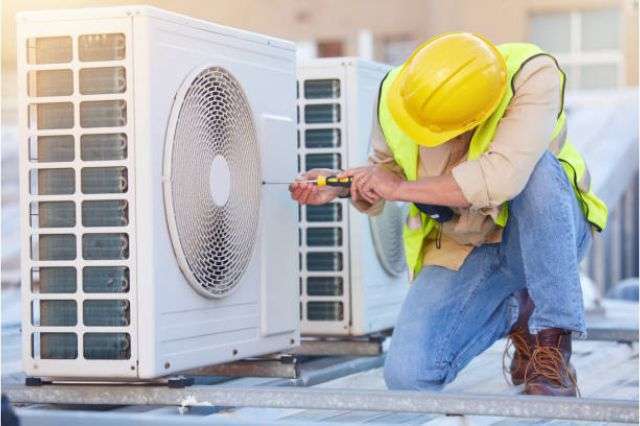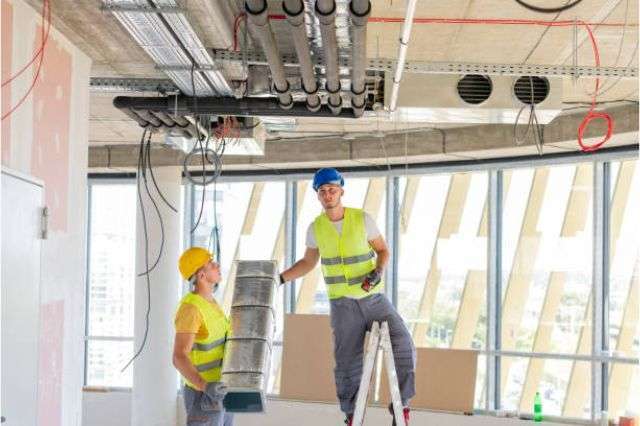How to Start an HVAC Business in 2024: Profitability and Demand
Starting an HVAC business in 2024 can be very profitable. The demand for heating, ventilation, and air conditioning services is increasing rapidly. The global HVAC market is expected to reach $145.8 billion by 2025.
This growth of HVAC business opportunities in 2024 is driven by a focus on energy efficiency, sustainability, and indoor air quality. New technologies have led to smart HVAC systems, offering progressive solutions.
However, starting a successful HVAC business requires careful planning, execution, and compliance with regulations. This article will help you navigate the process step-by-step, from licenses and certifications to marketing and customer service.
It’ll provide valuable HVAC business tips, insights, and practical advice to overcome challenges and succeed in this lucrative industry so that you can start your HVAC business with confidence and achieve success.

How to Start An HVAC Business
Starting an HVAC business requires careful planning, execution, and compliance with industry regulations. Here’s a step-by-step HVAC business startup guide to help you:
- Research and planning:
This can be summed up into 3 steps:
– Identify your target market (residential, commercial, or industrial).
– Analyze your competition and the market demand for your product.
– Develop a HVAC business plan, including budget, marketing strategies, and revenue projections. This is very important especially if you’re seeking investors for your business.
- Licenses and certifications:
You’ll need to obtain necessary licenses and certifications, such as HVAC contractor licenses, business licenses, and EPA certifications. This is to ensure that you meet local and state regulations in your journey to HVAC entrepreneurship.
- Insurance and bonding:
Secure liability insurance, workers’ compensation insurance, and property insurance so that you’ll be prepared if anything goes wrong. Also, consider obtaining bonds to protect customers and ensure compliance.
- Equipment and supplies:
Invest in essential tools, equipment, and supplies, such as HVAC systems, diagnostic tools, and safety gear.
- Hiring and training:
Hire experienced technicians and support staff. You’ll also need to provide comprehensive training on HVAC systems, safety procedures, and customer service.
- Marketing and advertising:
In HVAC business marketing, you’ll need to spread word about your business. So, develop a website and social media presence. Utilize search engine optimization (SEO) and online advertising. Create a referral program and offer promotions for brand awareness.
- Operations and management:
This involves doing the following:
– Establish efficient workflows and scheduling systems.
– Implement customer relationship management (CRM) software.
– Monitor finances, performance, and customer satisfaction.
- Compliance and safety:
You have to adhere to industry standards, building codes, and safety regulations. Ensure proper disposal of hazardous materials and waste.
- Continuous improvement:
Continuously improve by staying updated on industry developments, technologies, and best practices. You can stay updated by attending conferences, workshops, and training sessions.
By following these steps and adapting to industry trends, you can establish a successful HVAC business setup in 2024 and beyond.

The Demand for HVAC
Many people need HVAC systems, so there is a high demand for HVAC company startups. Additionally, there aren’t enough workers to install and fix these systems, so more technicians are needed. New buildings are being constructed, and they all need HVAC systems.
Older systems are becoming outdated and need to be replaced. The government encourages people to upgrade to energy-efficient systems, which adds to the demand. These are a few reasons why HVACs are in demand. Let’s examine them in detail.
- Governments are building better hospitals and healthcare facilities, requiring modern HVAC systems: Governments are investing in healthcare infrastructure, driving demand for HVAC installation and maintenance. Hospitals need them to keep patients healthy and comfortable. How so? Hospitals need precise temperature and humidity control for patient care and equipment.
- More people are moving to cities, leading to a higher demand for HVAC services in homes and buildings: Urbanization increases the need for housing and commercial spaces, driving construction and HVAC demand. Cities require more HVAC services for residential and commercial buildings. As more people move to cities, there are more buildings that need these machines.
- Big companies need reliable HVAC systems to run their data centers, which store digital data:
Data centers require precise temperature and humidity control to prevent overheating and equipment failure.
Companies rely on HVAC services to maintain data center operations and prevent downtime thus keeping their computers and data safe.
- Governments are promoting energy-efficient heating and cooling technologies to reduce energy consumption: Governments want people to use machines that don’t waste energy. Governments offer incentives for energy-efficient HVAC systems, driving adoption. Energy-efficient technologies reduce energy consumption and environmental impact.
- Advanced technologies like IoT make HVAC systems smarter and more efficient, appealing to tech-savvy consumers: IoT sensors and analytics optimize HVAC performance and energy efficiency. Smart HVAC systems attract consumers seeking convenience and energy savings.
- As people earn more, they demand energy-efficient solutions, driving the market for HVAC services: Increased disposable income enables consumers to invest in energy-efficient HVAC systems. Energy-efficient solutions become more desirable as consumers prioritize sustainability. Simply put, as people have more money, they want machines that are good for the planet.
- The global construction industry is growing, creating opportunities for HVAC services: The construction industry is growing, so there are more buildings that need these machines.New buildings require HVAC installation, driving demand for services.
- Green building development and energy efficiency initiatives are driving demand for HVAC services in China and worldwide: Green building certifications promote energy-efficient HVAC systems. Governments encourage people to build green buildings that are good for the planet thus driving demand for HVAC services.
Why the HVAC Business is a Profitable One
The HVAC (Heating, Ventilation, and Air Conditioning) business is a profitable one for several reasons. We’ll be highlighting a list of those reasons below. We’ll also examine some profitable HVAC business ideas.
- Essential Service: HVAC systems are essential for comfort, health, and safety in buildings, making the service a necessity.
- Recurring Revenue: Regular maintenance and repairs are needed, providing a steady stream of income.
- High Demand: Growing construction, urbanization, and energy efficiency demands drive the need for HVAC services.
- Limited Competition: Barriers to entry, like licensing and expertise, limit competition, allow established businesses to thrive.
- Variety of Services: HVAC companies can offer diverse services, including installation, maintenance, repairs, and upgrades, increasing revenue potential.
- Technology Advancements: The adoption of smart HVAC systems and energy-efficient technologies creates new opportunities for sales and services especially with the tech savvy audience.
- Government Incentives: Rebates and tax credits for energy-efficient upgrades encourage homeowners and businesses to invest in HVAC services.
- Expanding Services: HVAC companies can expand into related services like plumbing, electrical work, and indoor air quality solutions, increasing profitability.
- Commercial and Industrial Clients: Large commercial and industrial clients provide significant revenue opportunities due to their extensive HVAC system needs.
- Potential for Subscription Models: Offering maintenance contracts and subscription services can generate recurring revenue and increase customer loyalty.
These factors combined can create a successful HVAC business environment that provides essential services, diversified offerings, and adapts to technological advancements and market demands.
To thrive in the HVAC industry, it’s essential to stay ahead of the curve. One way you can do that is by emphasizing energy efficiency and sustainability by offering eco-friendly products and solutions that reduce carbon footprints.
Secondly, integrate cutting-edge technology, such as smart thermostats and HVAC systems, into your services. Most importantly, prioritize exceptional customer experiences as one of your HVAC business strategies through responsive communication, prompt service, and outstanding support.
Maintain efficiency using technology and software to streamline estimating, invoicing, and project management. In order to grow your HVAC business, consider diversifying your services to include related offerings like plumbing, electrical work, or indoor air quality solutions.
By embracing these trends and tips, you’ll be well-equipped to succeed when launching your HVAC business in the competitive HVAC landscape.
The post How to Start an HVAC Business in 2024: Profitability and Demand appeared first on The Total Entrepreneurs.
If you re eager to discover more about how we can elevate your digital presence, don t hesitate to explore our full range of services. Click on the link below to delve into a world of tailored strategies, innovative solutions, and a dedicated team ready to amplify your online impact. Your digital success story starts here.
Explore Our Services





